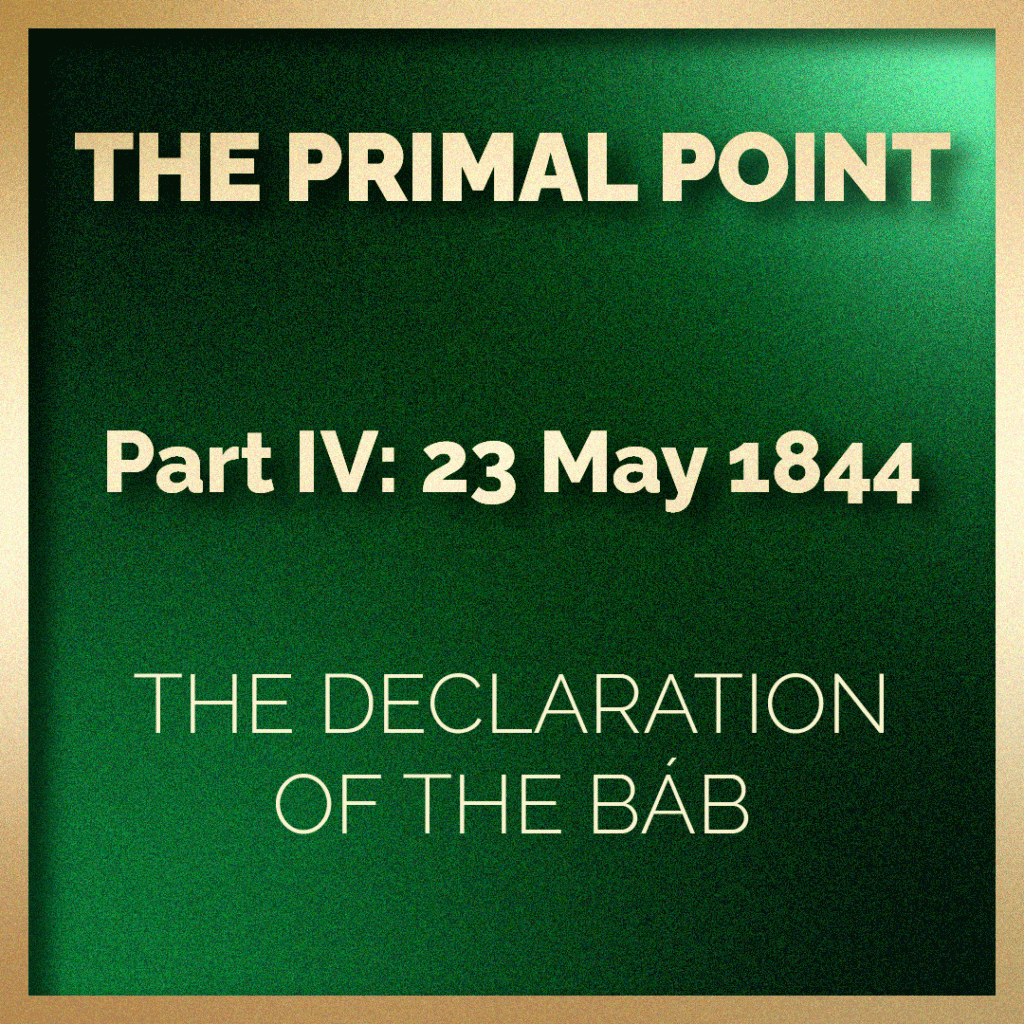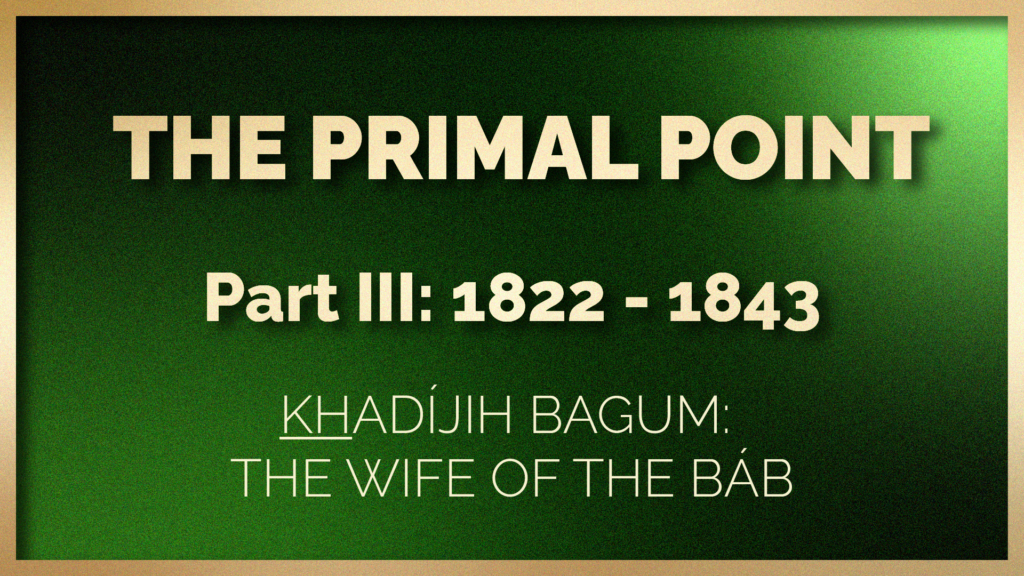
Written and illustrated by Violetta Zein
This part covers the life of the Báb from the age of 23 in 1842 to the age of 24 in 1843, and the life of Khadíjih Bagum from her birth in 1822 to the age of 21 in 1843.
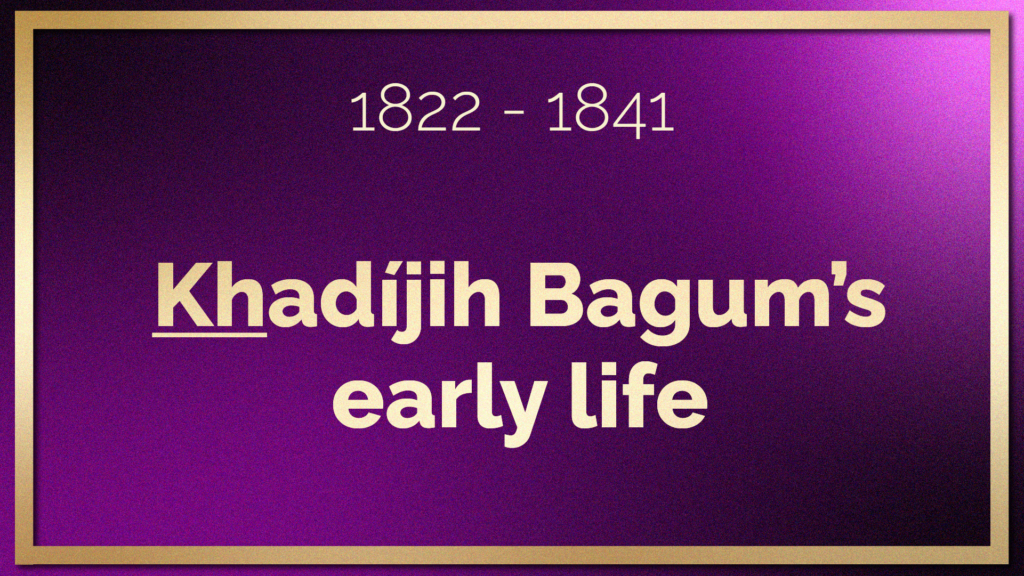
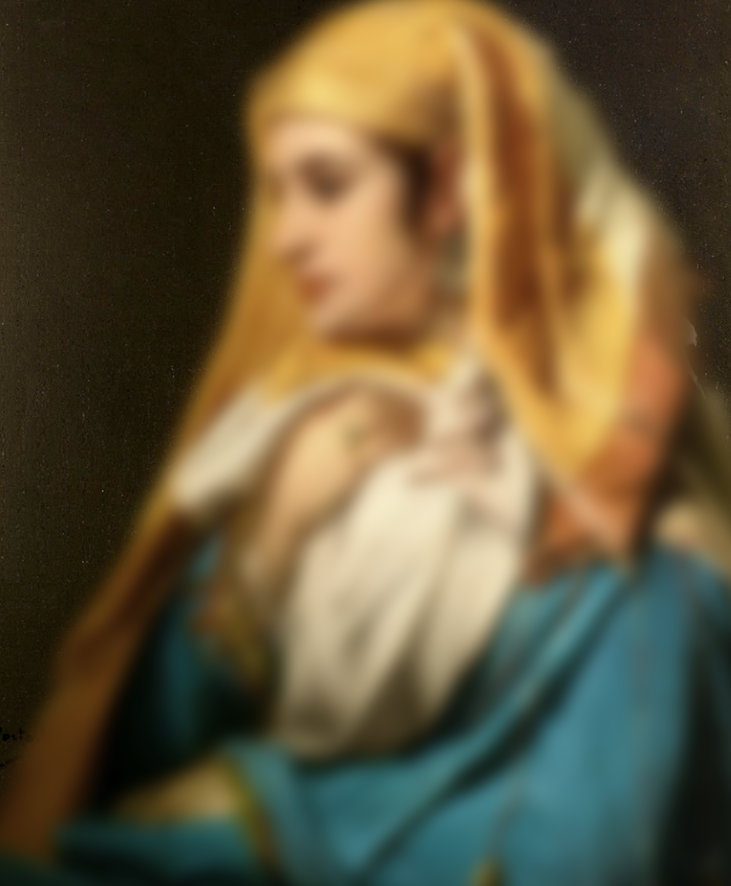
“Generations”: A blurred image of Jean-François-Portaels’s insightful post-1877 painting “Oriental Woman” as a meditation on generations separating ancestors and their descendants in this story about Khadíjih Bagum’s genealogy. Source of image inspiration: Wikimedia Commons.
Khadíjih Bagum was born Khadíjih Sulṭán Shírází in 1822, three years after her future husband, the Báb.
Her parents were Mírzá Siyyid ‘Alí and Ḥájíyih Bíbí. Her father, Mírzá Siyyid ‘Alí was a merchant importing goods from Búshihr. He worked in the Báb’s family’s mercantile business and he was the least successful member of the family.
Khadíjih Bagum, like the Báb, was descended from the family of the Prophet Muḥammad, through Khadíjih, His wife.
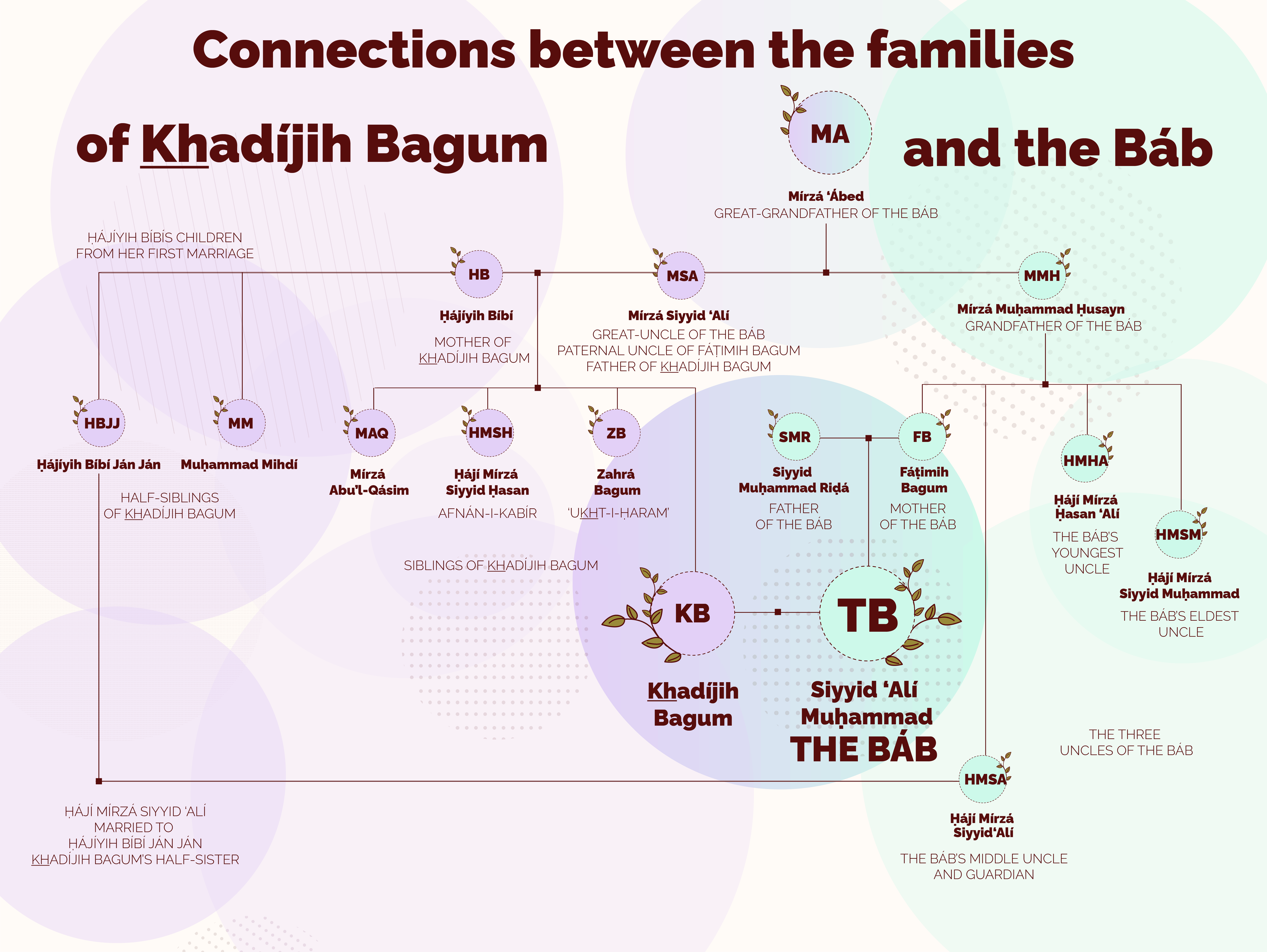
Connections between the families of Khadíjih Bagum and the Báb, created from historical sources mentioned in the references at the bottom of this webpage for the story below, and information in the graphic of the Genealogy of the Báb Afnán: Genealogy of the Afnān Family by Moojan Momen published in Encyclopaedia Iranica, Volume 1 New York: Columbia University, 1985. Design © Violetta Zein. To view this image full size, right-click on the image and choose the option “Open image in a new tab.”
Because of the similarity in name of Khadíjih Bagum’s father, Mírzá Siyyid ‘Alí, and the Báb’s uncle and guardian, Ḥájí Mírzá Siyyid ‘Alí, and because the families of Khadíjih Bagum and the Báb are connected in several ways, this section is meant to make the relationships clear.
Khadíjih Bagum’s father, Mírzá Siyyid ‘Alí, was the paternal uncle of Fáṭimih Bagum, the Báb’s mother.
This means that the Báb and Khadíjih Bagum were second cousins once removed.
Khadíjih Bagum had an older sister, Zahrá Bagum, later better known as ‘Ukht-i-Ḥaram’ (Sister of the Honorable Wife), and two older brothers, Ḥájí Mírzá Siyyid Ḥasan, the future Afnán-i-Kabír (The Great Afnán), and Mírzá Abu’l-Qásim, to whom she was very close.
Khadíjih Bagum also had two older half-siblings from her mother’s first marriage: a half-brother named Muḥammad Mihdí, and a half-sister, Ḥájíyih Bíbí Ján Ján.
Khadíjih Bagum’s half-sister, Ḥájíyih Bíbí Ján Ján, was the wife of the Báb’s uncle and guardian, Ḥájí Mírzá Siyyid ‘Alí.
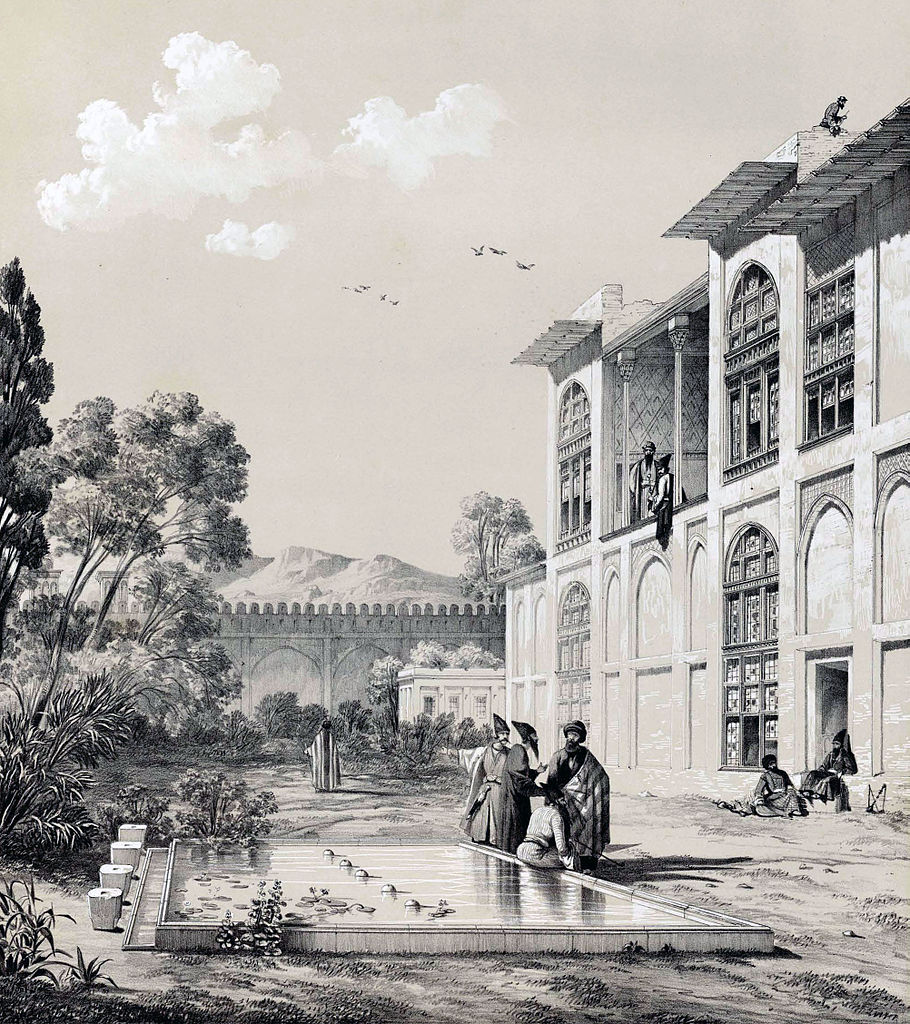
A view of the city that both the Báb and Khadíjih Bagum grew up in. The Arg, the citadel of Karim Khán in central Shíráz in the 1840s from Voyage en Perse, avec Flandin, éd. Gide et Baudry. Source: Wikimedia Commons.
The house where Khadíjih Bagum grew up, her father Mírzá Siyyid ‘Alí’s residence, was right next door to the house where the Báb came to live after His father passed away, the home of His maternal uncle, Ḥájí Mírzá Siyyid ‘Alí.
As children, the Báb and Khadíjih Bagum were neighbors and playmates.
Whenever the children of the two households (Ḥájí Mírzá Siyyid ‘Alí’s and Mírzá Siyyid ‘Alí’s) came together to play, the Báb only rarely joined in the games the other children played, but He was always kind and considerate.
As they grew closer to the age of maturity, 14/15 years in Islamic culture, Khadíjih Bagum no longer played with the boys. We do not have any information as to how much education she received, as we possess very few details about her early life, but it does seem from her recollections that she had a happy childhood.
In 1836, when Khadíjih Bagum was 14 years old, the Báb left Shíráz for Búshihr and she would not see Him again for 6 years.
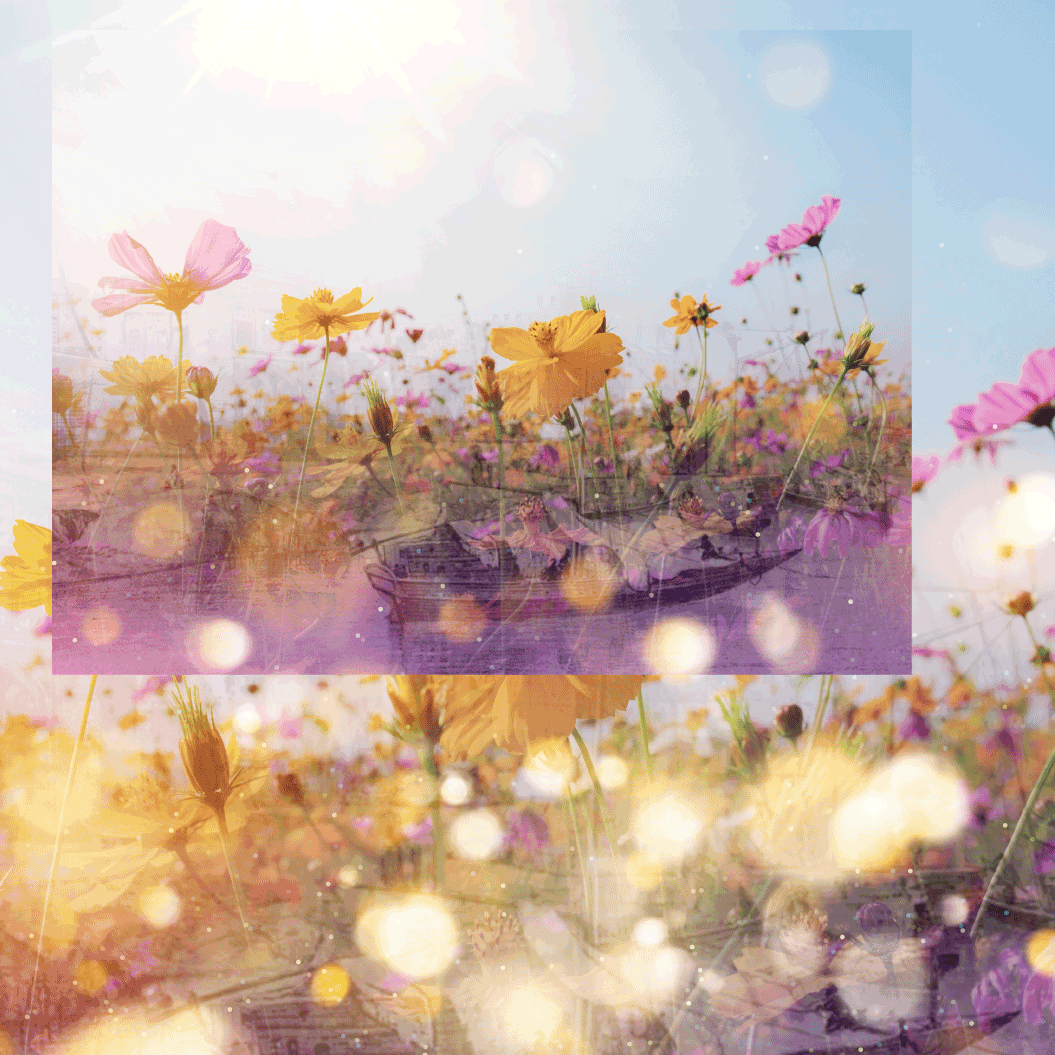
“Radiant dream”: An artistic interpretation of Khadíjih Bagum’s first dream of the Báb while He was working in Búshihr, the flowering meadow in which she sees Him, radiant, overlaid over an image of Búshihr. © Violetta Zein. Source of the flowering meadow photograph: Pexels. Source of the engraving of Búshihr: Wikimedia Commons.
During their years of separation, Khadíjih Bagum had profound dreams about the Báb that indicate they shared a special spiritual bond.
In one of these vivid dreams, Khadíjih Bagum saw the Báb in a verdant plain, filled with flowers. His radiant face was turned towards the Qiblih at Mecca in an attitude of prayer, and wore a green labbádih, or outer coat, on which Qur’ánic verses were embroidered in threads of gold. One of the verses was the Verse of Light, Áyatu’l-núr (Qur’án 24:35).
Light emanated from the Báb and the dream brought Khadíjih Bagum such intense happiness at seeing the Báb in this state, that she awoke.
After this dream, she knew that the Báb was a great Being, and her heart became filled with love for Him, but she did not share her dream with anyone.
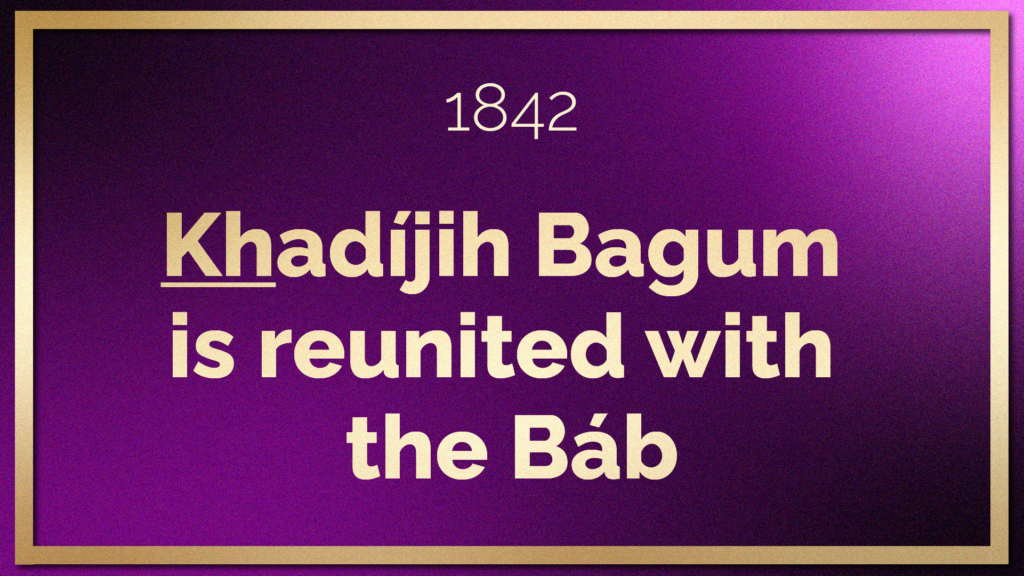
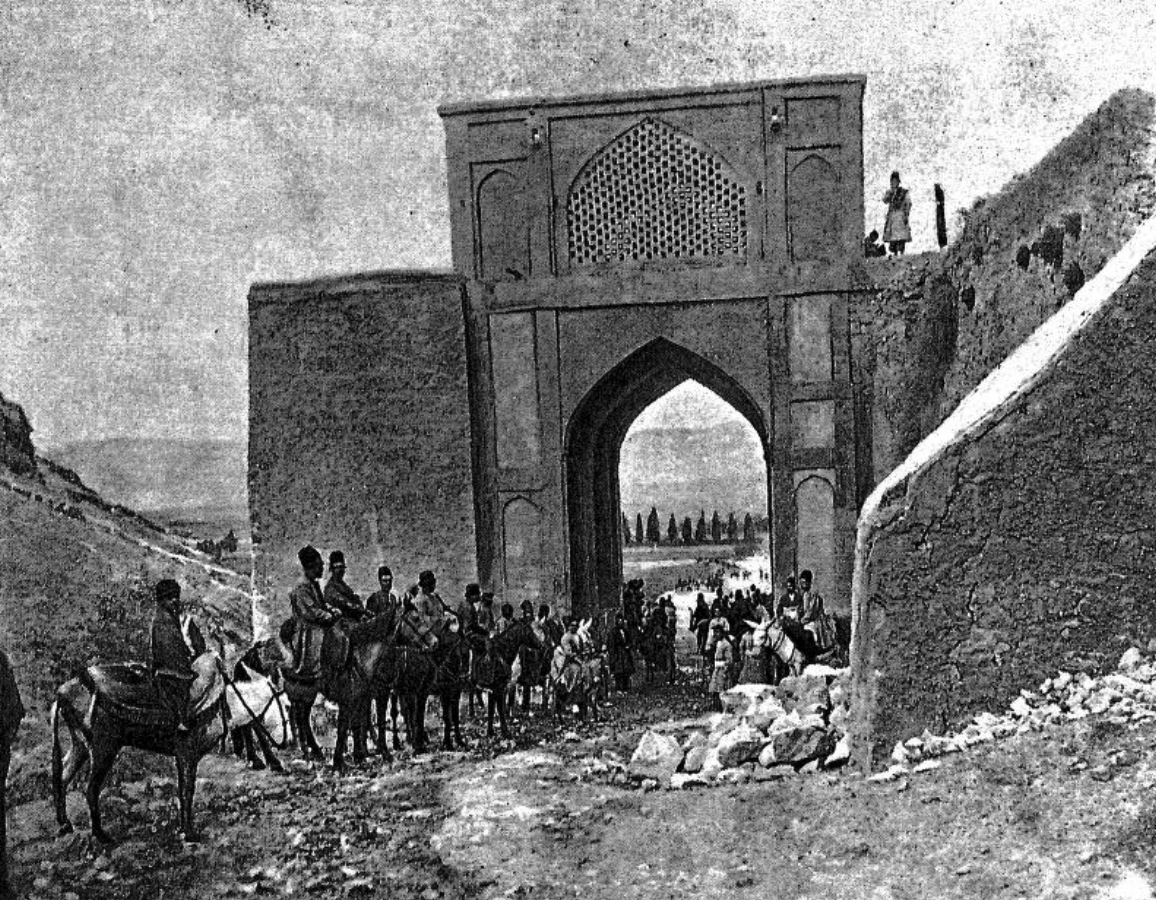
As a symbol of the Báb’s return to Shíráz, the main gate of the city, Tang-i- Alláh’u-Akbar Gate in Shíráz in 1888 Persia And The Persian Question Volume II, page 92. Source: Archive.org.
Several months after ‘the Báb had returned to Shíráz from His year in 'Iráq, He began to speak of going back to 'Iráq for the ‘Atabát.
Hearing Him speak this way made His mother Fáṭimih Bagum grow anxious and she began to plan for His marriage with Khadíjih Bagum, her niece.
The Báb and Khadíjih Bagum were now both young adults in their twenties and Fáṭimih Bagum began to set things in motion for their wedding after having spoken to her brother, Ḥájí Mírzá Siyyid ‘Alí and enlisted his help to successfully ensure their marriage.
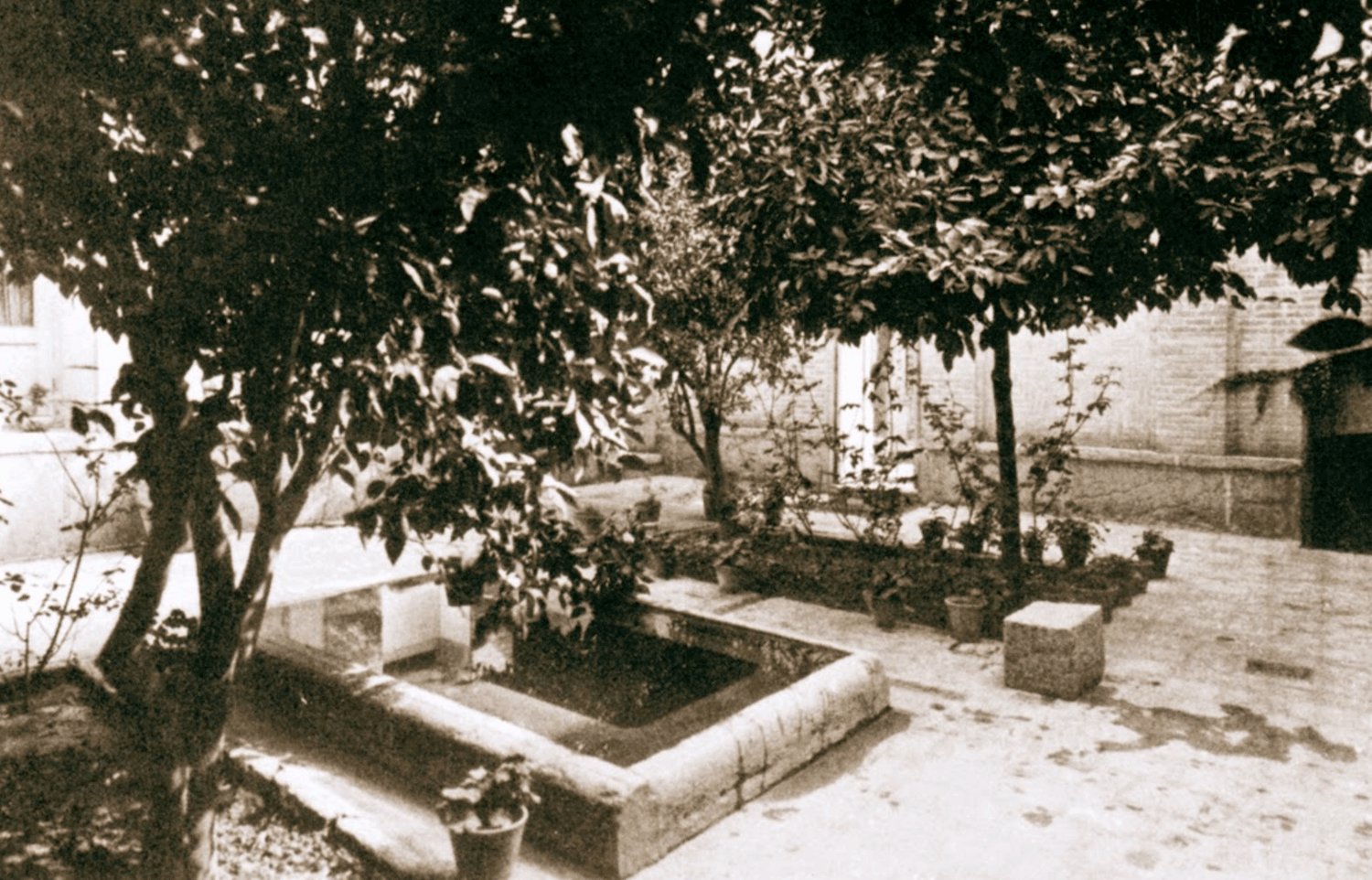
View of the garden in the courtyard of the House of the Báb in Shiraz, where Ḥájí Mubárak lived. On the right, towards the center, is seen the entrance from an adjoining dwelling.(The Baha'i World 1976-1979). Source: Baha'i Points of Interest.
In 1842, when the Báb was getting ready to get married, He started creating His household, and included Ḥájí Mubárak, the servant who had raised him since the age of 7, but who had worked for another member of the family.
After His father’s death, the Báb had spent a lot of time with Ḥájí Mubárak, who we believe was approximately 15 years older than the Báb.
It is abundantly clear from His Writings and prayers that the Báb was very attached to Ḥájí Mubárak and considered him not only to be like family, but also a father figure.
The Báb had complete trust in Ḥájí Mubárak, He had known him his entire life and trusted him completely and He now included him in His household.
Beyond the personal attachment of the Báb to Ḥájí Mubárak it is vital to realize that he was also highly skilled in matters of business.
Ḥájí Mubárak had received an exemplary education. He was deeply literate, and fluent in commerce, he had knowledge of accounting, and He was destined to be at the Báb’s side for many of the most important moments at the start of His Dispensation.
When Ḥájí Mubárak joined the Báb’s family, his quarters were set up in the southern courtyard of the Báb’s house.
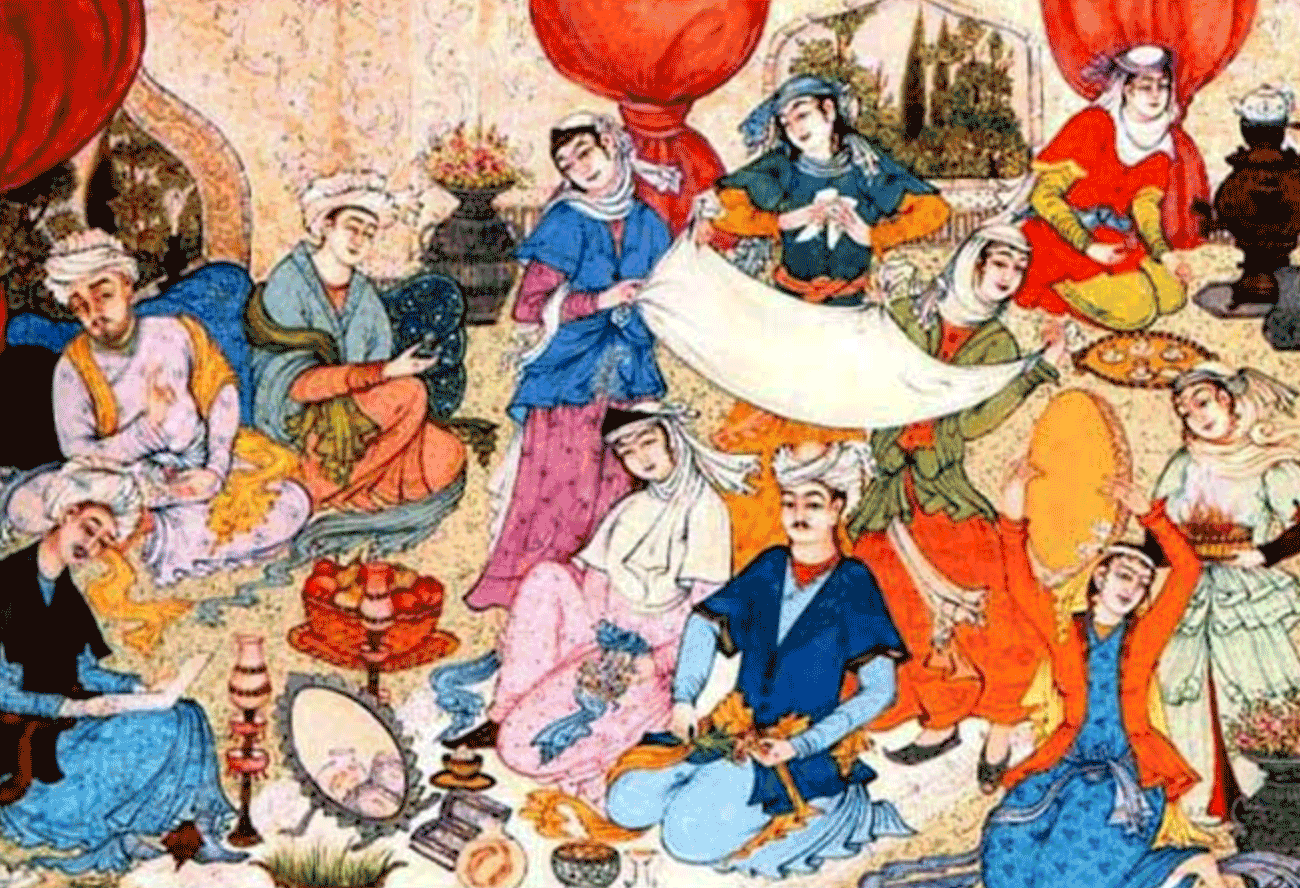
The feeling of joy and happiness in a Persian wedding, conveyed by the colorful Persian painting of a Persian wedding ceremony (undated). Source: Wikimedia Commons.
Shortly after the Báb’s return, Khadíjih Bagum had a meaningful dream in which she saw Fáṭimih, the daughter of the Prophet Muḥammad, visiting her home to discuss a proposal of marriage.
She recounted the extraordinary dream to Munírih Khánum years later:
"I dreamed a dream in which Fáṭimih, the daughter of Muḥammad, came to me and said: 'Arise! I desire that you become the wife of my son.’ So majestic she looked, as she stood, tall, slender, and graceful, so wonderful was the beautiful mien, so marvellous her loveliness of expression, so glorious her countenance, that I could no longer gaze upon her, but looked down, feeling overcome with awe, and all unworthy of so high an honour.
I did not speak of this vision to my sisters; they would have thought me to be filled with pride and self-assertion! But the vision filled my thought day and night; it seemed to enfold me in a kind of sacred atmosphere of joy indescribable!”
The next day, the Báb’s mother, Fáṭimih Bagum, and His grandmother called on Khadíjih Bagum’s mother, Ḥájíyih Bíbí. It was custom in their house whenever the Báb’s grandmother came to visit that everyone would hurry to greet her, kiss her shoulders, then wait at the threshold of the room for her permission to enter and take a seat. She was such a venerable and respected presence that everyone would keep silent until she addressed them, and only the Báb’s mother and Khadíjih Bagum’s mother could at first sit with her.
After everyone was seated on this auspicious day, Khadíjih Bagum served everyone sharbat—a type of syrup made from flower and herbal extracts mixed with sugar. After serving the syrup, Khadíjih Bagum left the room and her two older sisters, Zahrá Bagum and Ḥájíyih Bíbí Ján Ján, entered.
Not long after this, everyone rose up to leave. To Khadíjih Bagum’s surprise, the Báb’s mother kissed her on the forehead, just like her ancestor, Khadíjih, had done in her dream the night before.
When Ḥájíyih Bíbí saw the puzzled look on her daughter’s face, she explained:
“That kiss implied that she has asked your hand in marriage to her Son. You see, the dream you had last night has come true.”
Khadíjih Bagum was overjoyed.
By this time, the young Báb was very highly respected in the family, and was given extraordinary consideration. Account after account of His behavior, His demeanor, His character, had long since convinced Khadíjih Bagum that the Báb was exemplary, incomparable to His peers, and she later recalled how she had felt that wonderful day:
“From that day I felt a great stirring within my heart. It seemed that the gate of God's mercy and abundant bounty had been flung open before my face. I felt immeasurably proud of my coming union.”
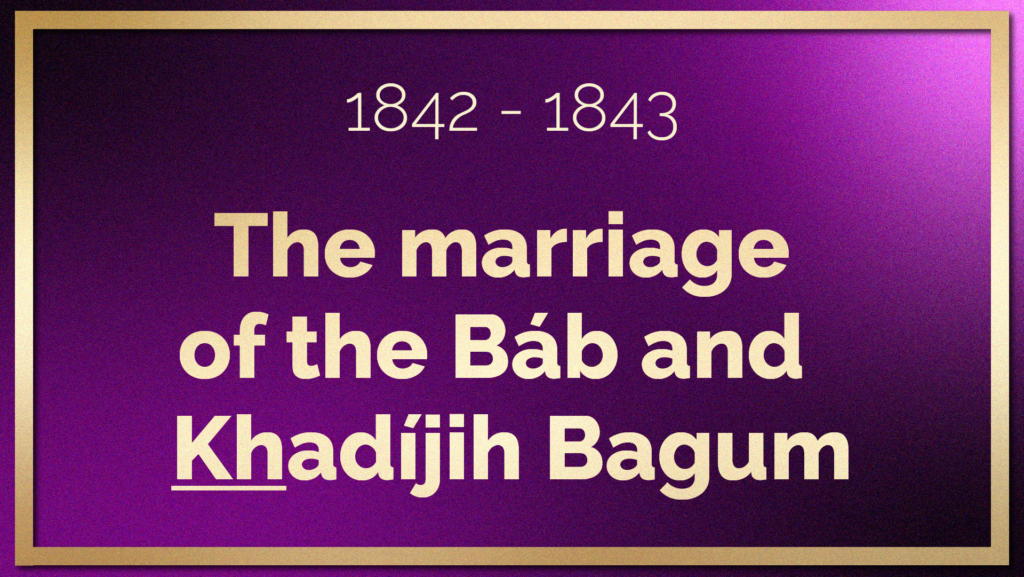
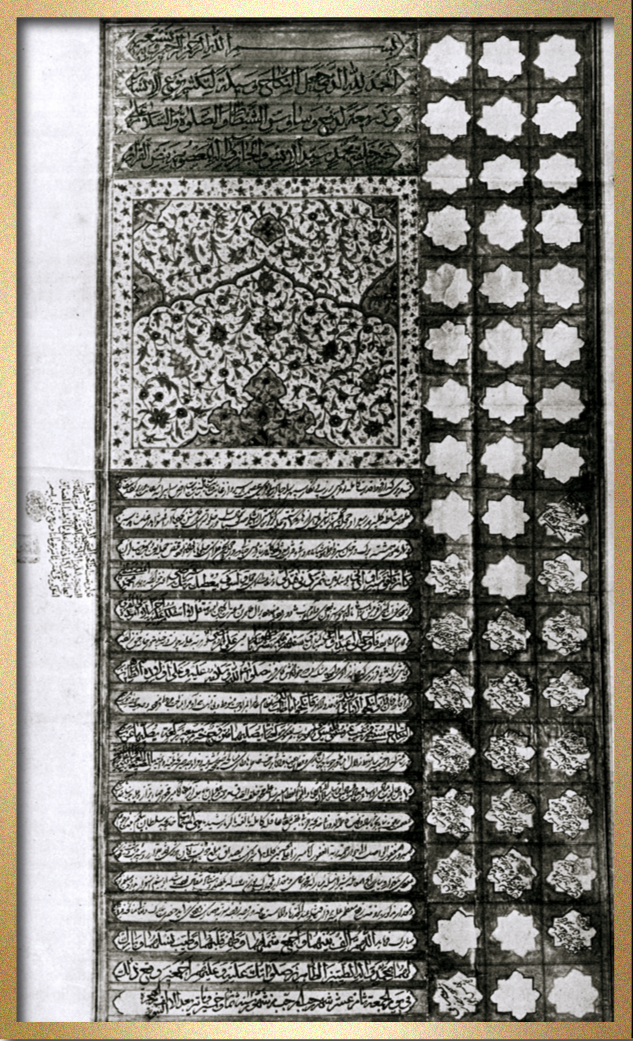
The marriage certificate of the Báb and Khadíjih Bagum. Source : Bahá’í Sacred Relics.
The process of arranging the marriage between the Báb and Khadíjih Bagum was swift and smooth. Several days after Fáṭimih Bagum came to ask for her hand in marriage, the negotiations took place and the exchange of gifts formalized the engagement.
The wedding itself took place two months after Fáṭimih Bagum’s visit to Khadíjih Bagum , on 25 August 1842 in Khadíjih Bagum ’s family home and in the presence of merchants, noblemen and the ‘ulamá of the province of Fars, where Shíráz was located.
It was officiated by Shaykh ‘Abú-Turáb, the Imám-Jumih (the Imám who leads the Friday prayers, considered distinguished for his intellect and virtue) of Shíráz and all the guests marveled at the beauty of the bride and groom.
As was customary for the time, the reception itself consisted in two celebrations, one for the men and one for the women. The men gathered in the house of the Báb’s uncle, Ḥájí Mírzá Siyyid ‘Alí, while the women gathered in the residence of Khadíjih Bagum’s father, which house was next door.
Khadíjih Bagum was intensely aware and grateful of the blessings of God in her marriage, telling her family:
“No words can ever convey my wonderful feeling of good fortune, and “His kindness towards me and His care for me were indescribable. He and His mother alike showered me with kindness and consideration.”
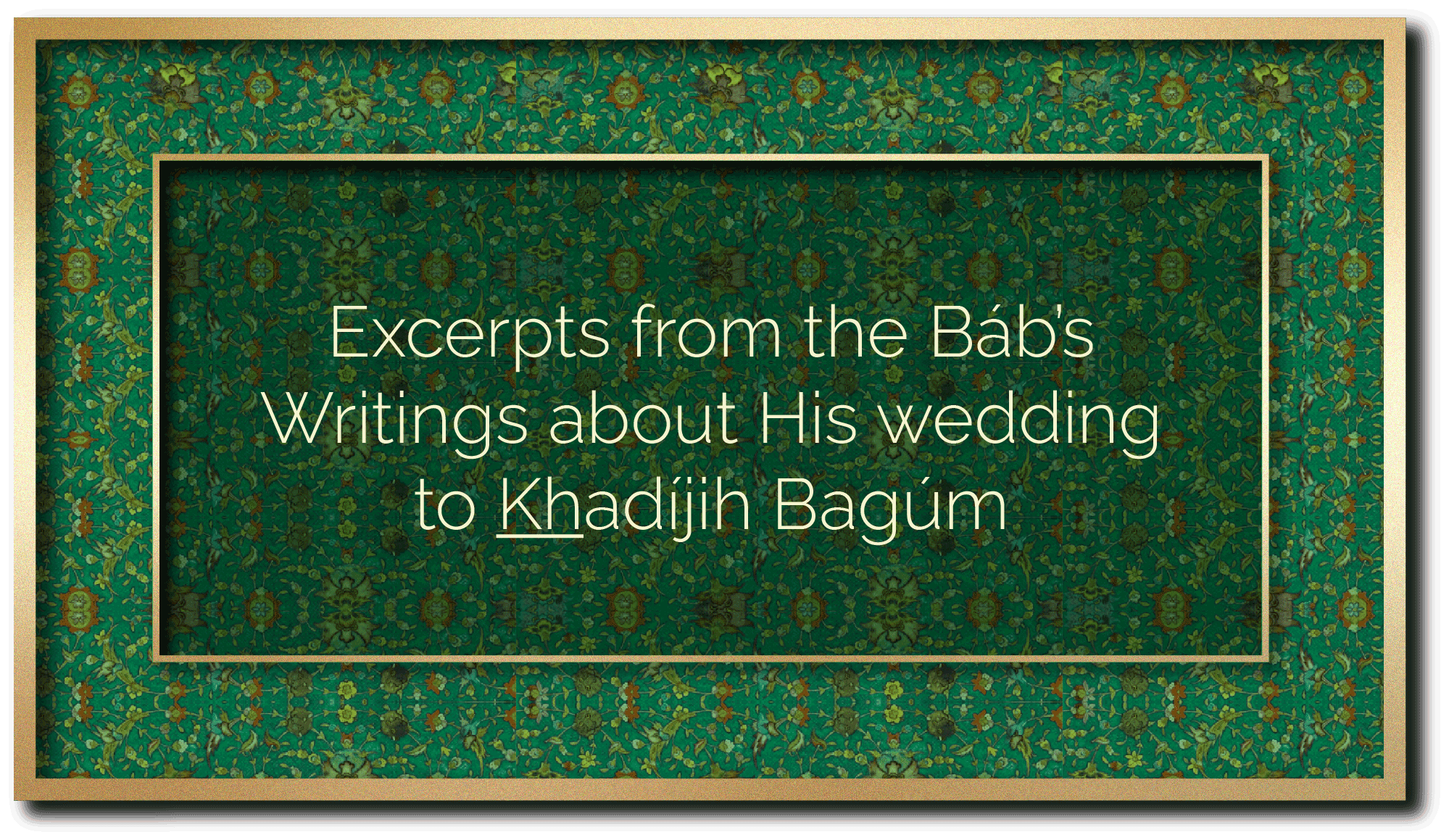
The Báb refers to His wedding as follows:
“O concourse of Light! Hear My call from the point of Fire in this ocean of snow-white water on this crimson earth. Verily, I am God, besides Whom there is no other God. On the exalted throne a beloved noble woman, bearing the same name [Khadíjih] as the beloved of the First Friend [the Prophet Muhammad], was wedded to this Great Remembrance; and verily, I caused the angels of Heaven and the denizens of Paradise, on the day of the Covenant, to bear witness, in truth, to God’s Remembrance”
And again:
“In truth I have become betrothed before the throne of God with Sara, that is to say, the dearly beloved, because 'dearly beloved' is derived from Dearly Beloved (the Dearly Beloved is Muhammad which signifies that Sara was a Siyyid). In truth I have taken the angels of heaven and those who dwell in Paradise as witnesses of our betrothal.”
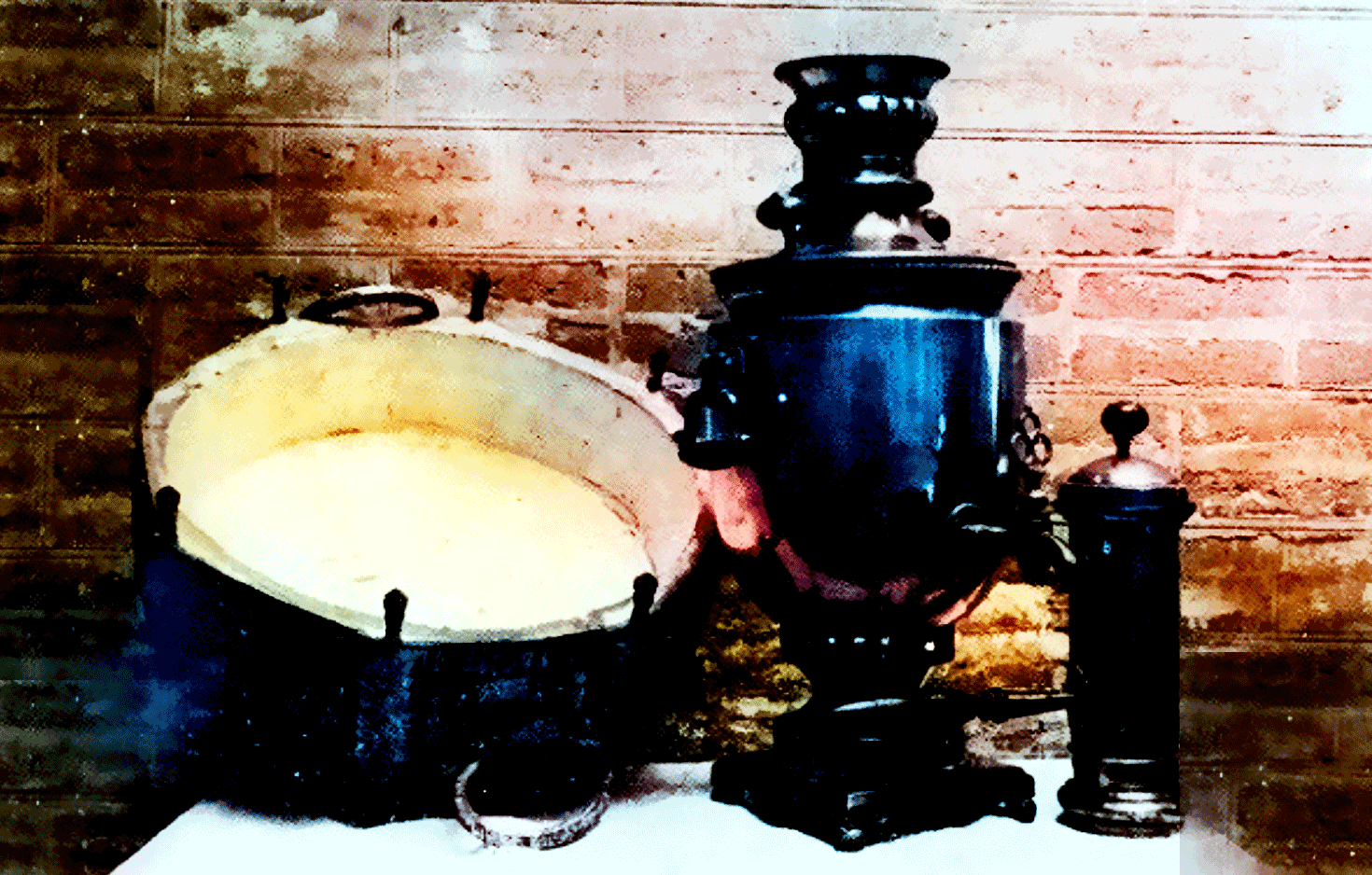
As a symbol of the happy early days of the marriage between Khadíjih Bagum and the Báb, a photo of precious relics: the Báb’s brazier and samovar, used daily in their house, as the next story recounts. Source: Nabíl, The Dawn-Breakers, page 55, colorized for this chronology by Violetta Zein.
The union of the Báb and Khadíjih Bagum was a marriage of pure love and they were deeply happy. The Báb was considerate and kind towards Khadíjih Bagum, and she was loved and well-treated by both her Husband and His mother, who both showered her with kindness.
The young and beautiful couple was held in high esteem, almost sacred veneration, by their friends and neighbors, both of high and of low social status. The Báb’s character was so holy that their close friends and relatives, aunts and uncles, convinced of His greatness and showed Him great respect.
The household of the Báb consisted of the married couple, the Báb’s mother, Fáṭimih Bagum, and two black servants: a woman named Fiḍḍih, and a man named Mubarak.
Remembering those few happy days of her early marriage, Khadijih Bagum said:
“No words can ever convey my wonderful feeling of good fortune.”
Khadíjih Bagum, after her marriage to the Báb was in a state of bliss:
“…I found myself completely detached from material things and my heart attracted only by Him. I could see by His behavior, His words, His tranquility, and dignity that He was a great person. But I never imagined that He was the Promised One, the Qá’im.”
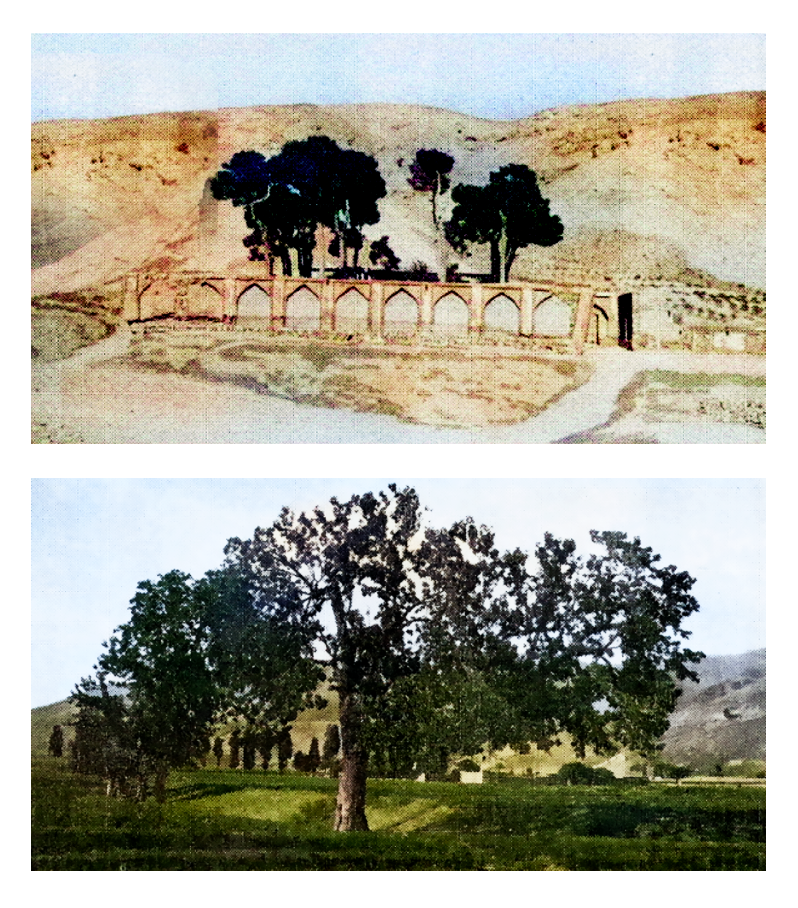
Two photographs of the outskirts of Shíráz where the Báb often went to walk, as recounted in the story below. Source: Nabíl, The Dawn-Breakers, page 56, colorized for this chronology by Violetta Zein.
The Báb rose morning one hour before dawn. After washing, He performed His ablutions, and climbed to the upper floor of the house, in the chamber that had been set aside as His formal guest room and which functioned like an outer apartment.
In that large room, He stood and recited Tablets of visitation, prayers, supplications, and invocations of the names of God.
After sunrise, the woman servant, Fiḍḍih, fired up the samovar and prepared tea in Fáṭimih Bagum’s room.
Once He had finished praying, the Báb came down had His morning tea with His wife and mother.
After tea, the Báb went into Shíráz to His uncle’s trading House in the Saráy-i-Gurmuk (the Customs Serai), and some afternoons, He took long walks in the fields outside the city.
The Báb’s custom was to return home each day about an hour after sunset, and begin His devotions, chanting the names of God and saying His evening obligatory prayers.
After His prayers, He devoted the early part of the evening to writing letters and meditations.
In the evenings, the Báb asked for His papers and account book. Khadíjih Bagum noticed that His papers weren’t business records, and she occasionally asked her Husband:
"What are these papers?"
The Báb smiled:
"These are account books on the people of the world."
When He was working on these papers, if an unexpected gust arrived suddenly, the Báb covered the papers over with a cloth.
Three hours after sunset, the Báb ate dinner and retired to His chambers one hour later for the night.
This was how life was, sweet and pleasant, until the evening of 22 May 1844, when Mullá Ḥusayn came to their door, and everything changed forever.
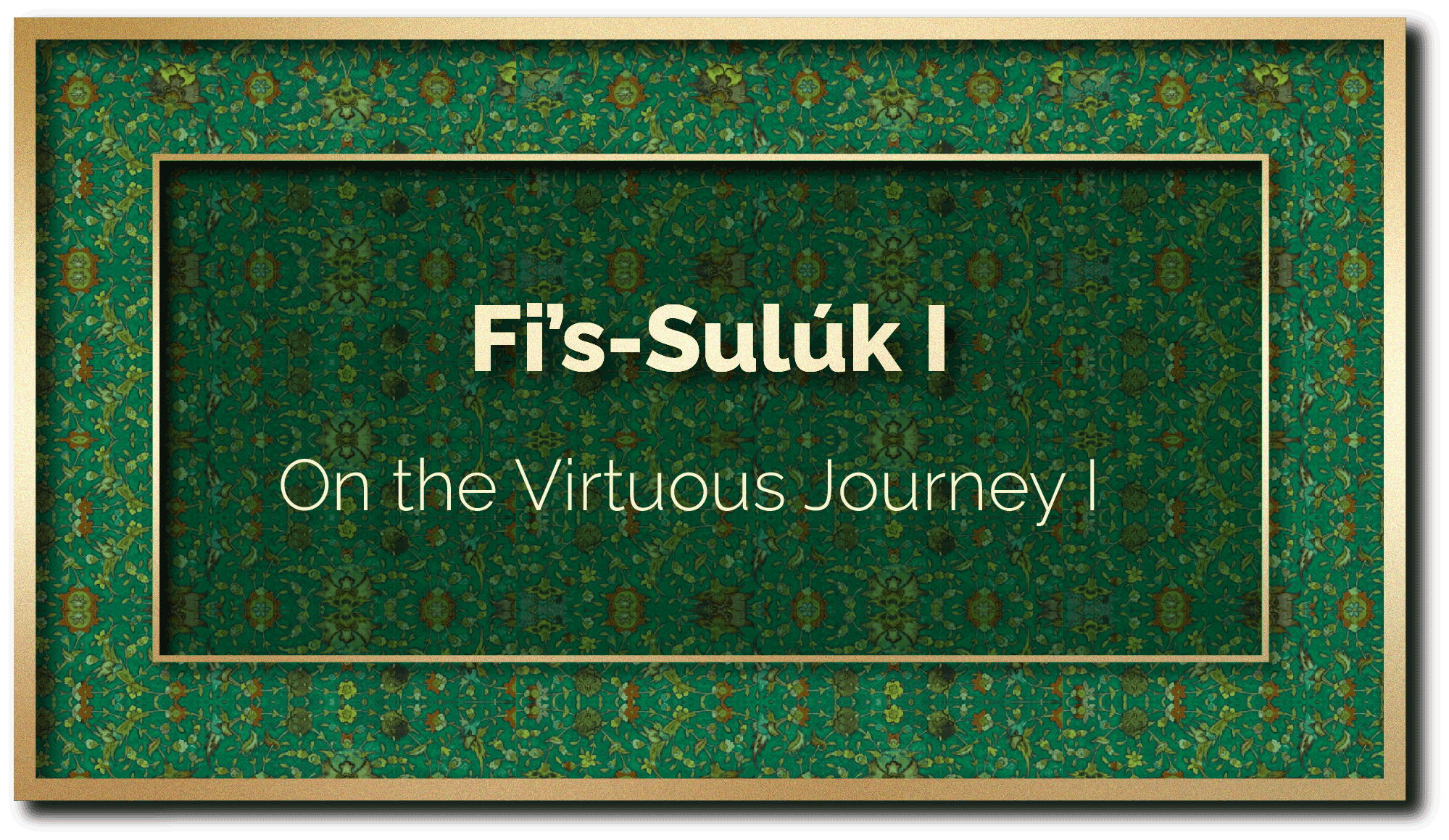
One of the earliest works of the Báb was the Fi’s-Sulúk I (On the Virtuous Journey I), a short epistle revealed before the death of Siyyid Káẓim. In this work, the Báb focuses on the inner mystical meanings of religious law, and interprets rituals as a spiritual journey. He also speaks in this work about the four layers of the divine Covenant in Islam.
The content of On the Virtuous Journey I is quite complex. It defines the essence of religion and the spiritual journey of the individual as the realiziation of divine love. This divine love, in turn, can only be realized when a person attains one of the four manifestations of love which are the four pillars of the Covenant with God. These four pillars are also levels that are inseparable from each other and are the manifestation and expression of God’s love for His creation, and the love of creation for its creator.
They are:
- The unity of God
- Prophethood
- The Imáms
- Gatehood
In this short but powerful Tablet, the Báb associates these four levels with the heart, intellect, soul, and body. The four-tier structure of this Tablet reflects the Báb’s deep attachment and interest to the teachings of Shaykh Aḥmad and Káẓimayn. According to Todd Lawson, the Báb’s interpretation of the next world in this Tablet is also a distinctive Shaykhí teaching, and shows a synergy of language between Ṣúfísm and Shaykhísm.
An annotated translation of On the Virtuous Journey I by Todd Lawson is available at Irfán Colloquia.
Partial Inventory ID: BB00297

"Fearsome lion" © Violetta Zein
Not long after her wedding, Khadíjih Bagum had a terrifying dream.
A fearsome lion was standing in the courtyard of their house and she found herself with her arms around the neck of the beast. The lion dragged her twice around the entire perimeter of the courtyard, and she woke up in a state of alarm and shaking from fear.
She recounted her dream to the Báb who explained:
“You awoke too soon. Your dream portends that our life together will not last more than two-and-a-half years.”
Although this devastating news distressed Khadíjih Bagum greatly, the Báb’s affection and kind words comforted her.
The Báb had started preparing His beloved wife to accept and face the tests and sufferings that would soon visit her.
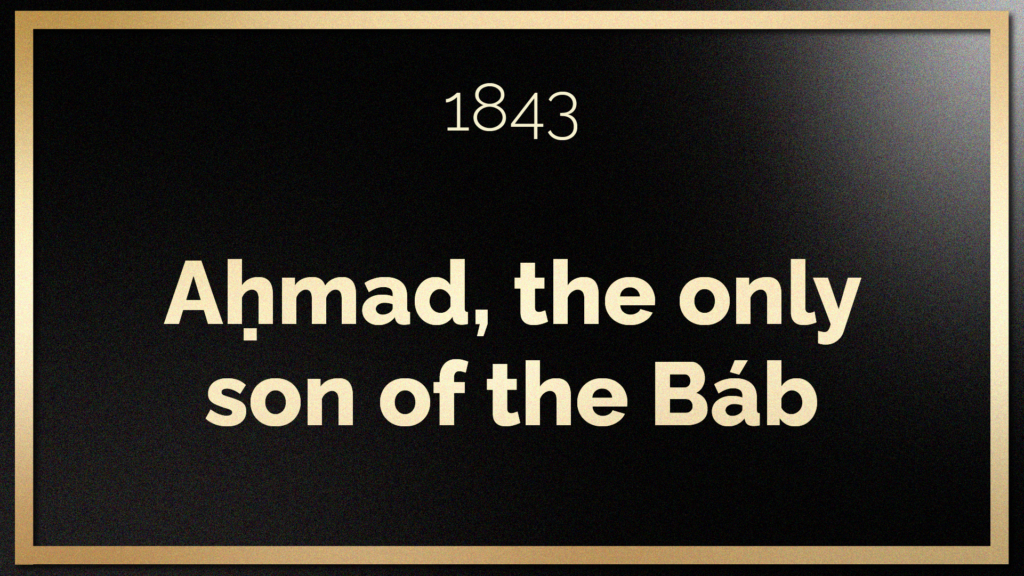
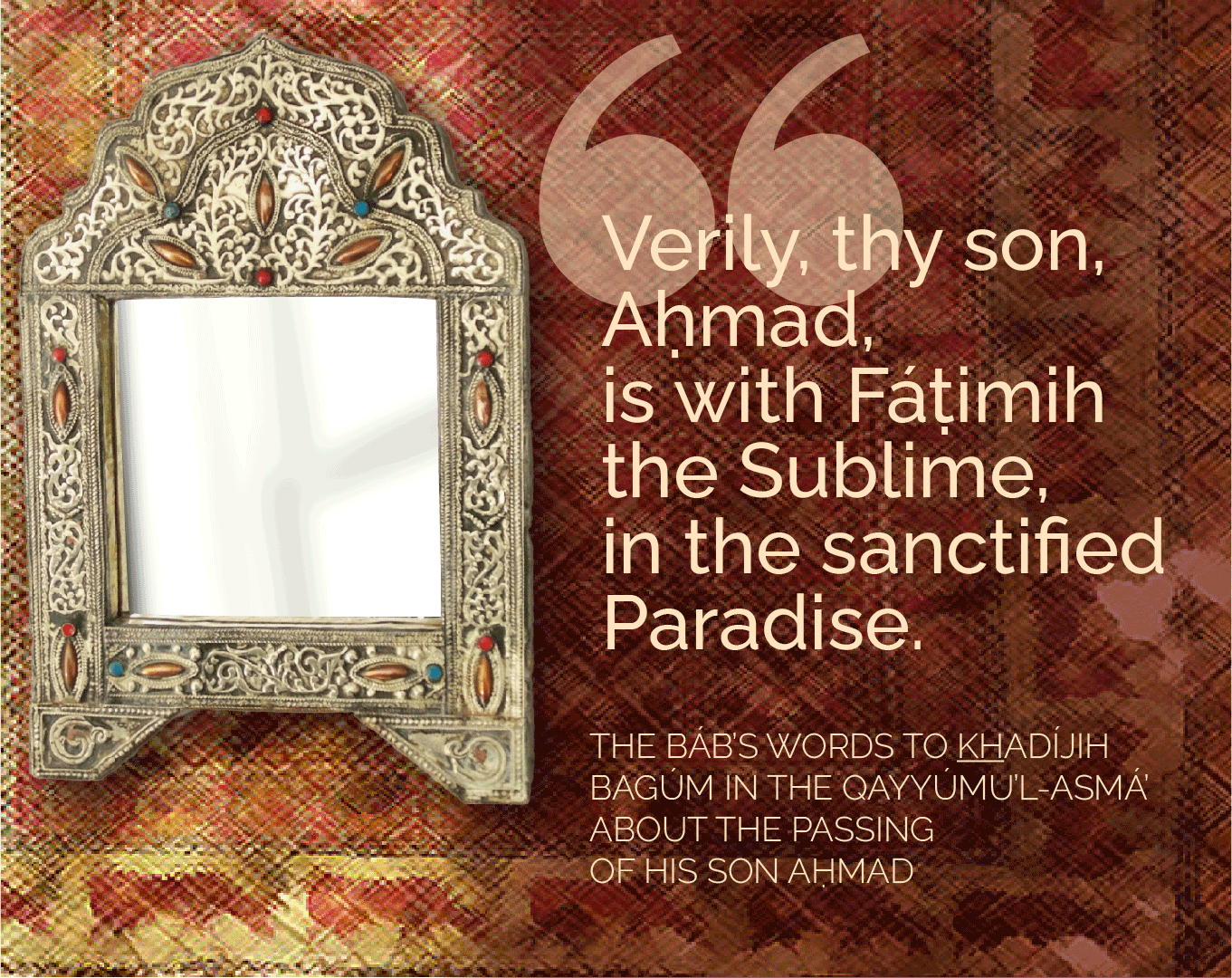
“Passing of Aḥmad”: The words of the Báb to Khadíjih Bagum in the Qayyúmu'l-Asmá' regarding the passing of their son. The antique Persian mirror is an homage to the mirror in the story about the baby's birth, and the prayer written on it by the Báb to save His wife's life. © Violetta Zein
About a year after their marriage, Khadíjih Bagum gave birth to the couple’s only child, a boy named Aḥmad.
While she was in labor, there came a moment when Khadíjih Bagum was on the verge of death and Fáṭimih Bagum ran to the Báb to inform Him.
The Báb took a mirror that was beside Him and wrote a prayer on it. He gave the mirror to His mother and instructed her to hold it in front of Khadíjih Bagum .
Shortly after, Khadíjih Bagum safely delivered a baby boy, whom the Báb named Aḥmad.
Tragically, their beloved baby did not live long, although the circumstances and date of his birth and passing are unknown.
Fáṭimih Bagum was not only heartbroken and grieved, but she was also angry. She confronted the Báb and asked Him, if He had such powers to reveal a prayer that could save the life of His wife, why couldn’t He have made the same attempt to save the life of His infant son, and spare His wife so much suffering?
The Báb smiled at His mother and replied that He was not destined to leave any descendants, an answer which infuriated His mother. She reproached Him further but He said no more.
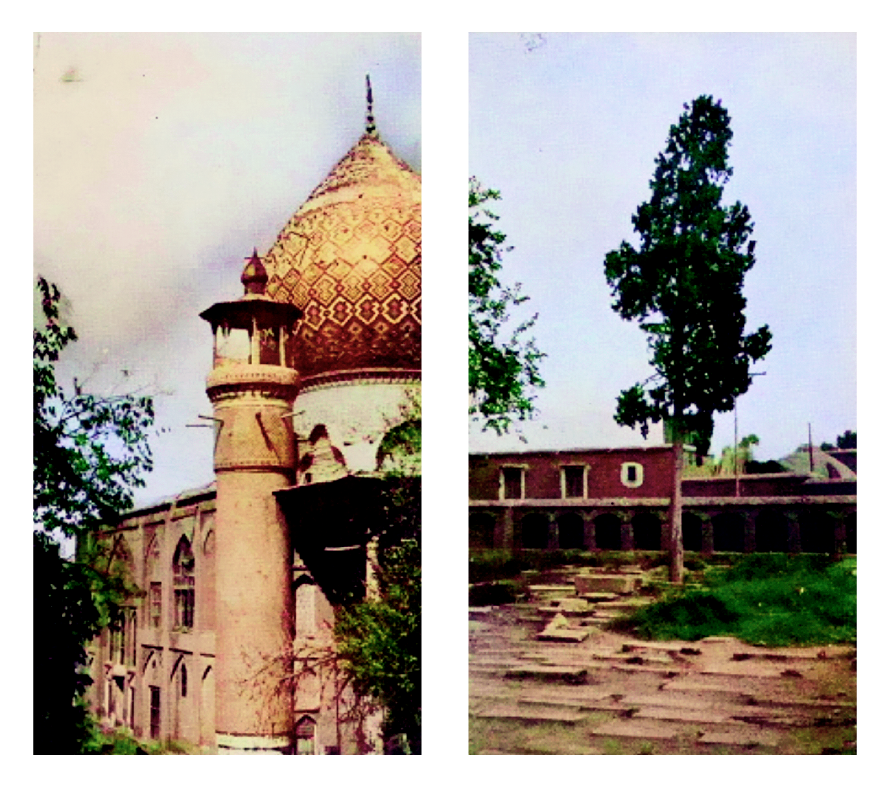
Tree marking the resting place of Aḥmad, the son of the Báb, in Bábí-Dukhtarán. Source: Nabil, The Dawn-Breakers, page 74, colorized for this chronology by Violetta Zein.
Aḥmad, the Báb’s only child, was buried under a cypress tree in the large courtyard of the tomb of Bíbí Dukhtarán.
One hundred and twelve years later, on the first day of Riḍván 1955, the Local Spiritual Assembly of Shíráz re-interred the remains of Aḥmad in the Bahá'í cemetery.
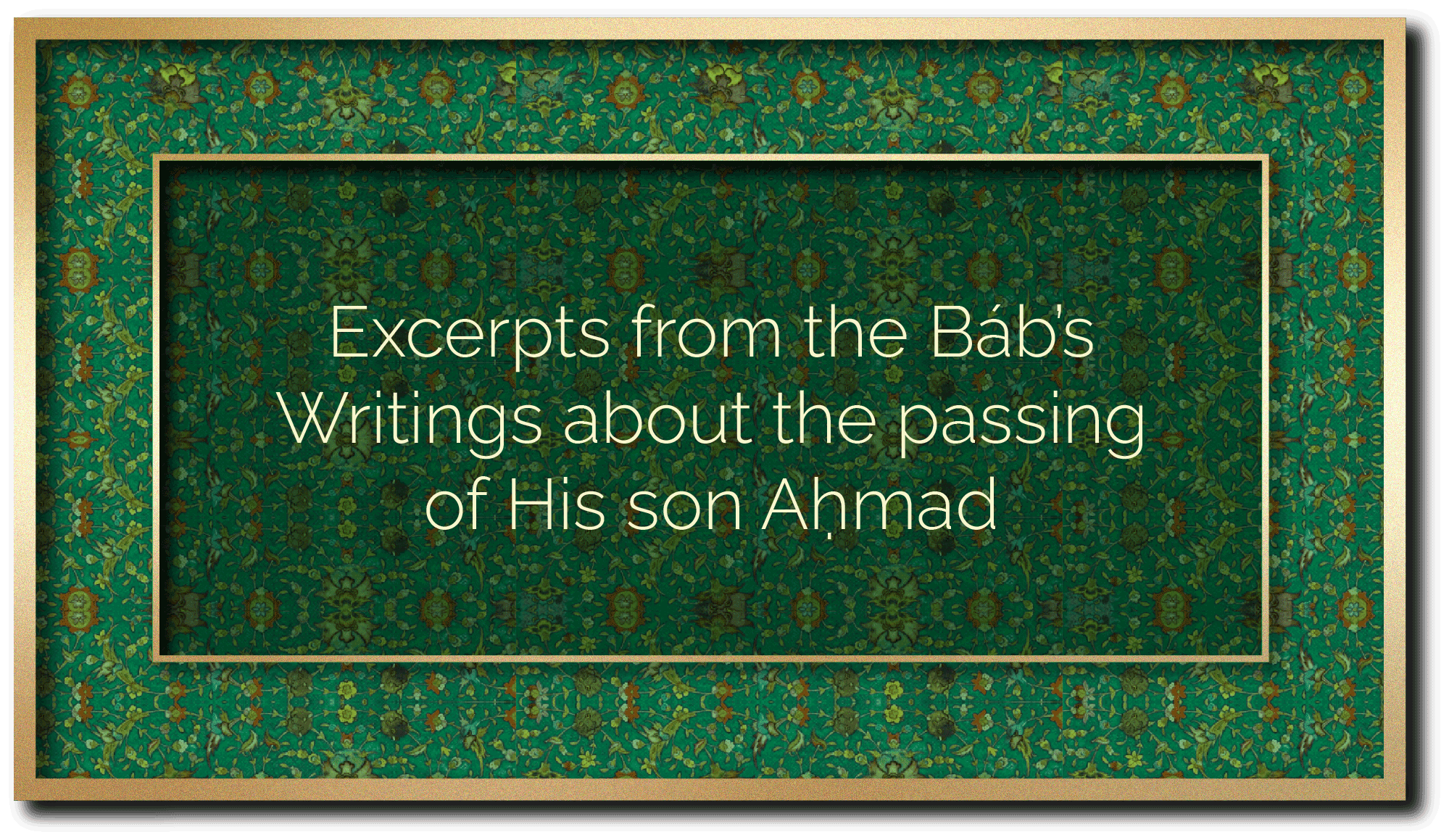
The Báb, in a great act of supreme sacrifice, consecrated the passing of His only son with these words:
“O God, my God! Would that a thousand Ishmaels were given Me, this Abraham of Thine, that I might have offered them, each and all, as a loving sacrifice unto Thee. O my Beloved, my heart's Desire! The sacrifice of this Aḥmad whom Thy servant 'Alí Muḥammad hath offered up on the altar of Thy love can never suffice to quench the flame of longing in His heart. Not until He immolates His own heart at Thy feet, not until His whole body falls a victim to the cruellest tyranny in Thy path, not until His breast is made a target for countless darts for Thy sake, will the tumult of His soul be stilled. O my God, my only Desire! Grant that the sacrifice of My son, My only son, may be acceptable unto Thee. Grant that it be a prelude to the sacrifice of My own, My entire self, in the path of Thy good pleasure.”
The death of Aḥmad was a cause of immense grief to the family of the Báb. About a year later, in the Súratu’l-‘Abd of the Qayyúmu’l-Asmá’, the Báb would speak of his baby’s death again in exalted terms:
“All praise be to God Who bestowed upon the Solace of the Eyes (the Báb), in His youth, Aḥmad. We did verily raise him up unto God . .. O Solace of the Eyes! Be patient in what thy God hath ordained for thee. Verily He doeth whatsoever He willeth. He is the All-Wise in the exercise of His justice. He is thy Lord, the Ancient of Days, and praised be He in whatever He ordereth.”
In another chapter of the Qayyúmu’l-Asmá’, the Báb speaks directly to His wife Khadíjih Bagum about the loss of her son, again lovingly encouraging her to be steadfast in the path of God:
“O well-beloved! Value highly the grace of the Great Remembrance, for it cometh from God, the Loved One. Thou shalt not be a woman, like other women, if thou obeyest God in the Cause of Truth, the greatest Truth. Know thou the great bounty conferred upon thee by the Ancient of Days, and take pride in being the consort of the Well-Beloved, Who is loved by God, the Greatest. Sufficient unto thee is this glory which cometh unto thee from God, the All-Wise, the All-Praised. Be patient in all that God hath ordained concerning the Báb and His Family. Verily, thy son, Aḥmad, is with Fáṭimih the Sublime, in the sanctified Paradise.”
REFERENCES FOR PART III
1822: Khadíjih Bagum, descendent of Khadíjih
H.M. Balyuzi, Khadíjih Bagum, The Wife of the Báb, pages 1-2.
Baharieh Rouhieh Ma’ani, Leaves of the Twin Divine Trees, pages 26-27, and 35.
Wikipedia: Khadíjih-Sultán.
Lady Blomfield, The Chosen Highway, page 75.
Fereydun Vahman (Editor),The Bab and the Babi Community of Iran (2020), Chapter 1: The Báb: A Sun in a Night Not Followed by Dawn by Fereydun Vahman.
The family connections between Khadíjih Bagum and the Báb
H.M. Balyuzi, Khadíjih Bagum, The Wife of the Báb, pages 1-2.
Baharieh Rouhieh Ma’ani, Leaves of the Twin Divine Trees, pages 26-27, and 35.
Wikipedia: Khadíjih-Sultán.
Lady Blomfield, The Chosen Highway, page 75.
Fereydun Vahman (Editor),The Bab and the Babi Community of Iran (2020), Chapter 1: The Báb: A Sun in a Night Not Followed by Dawn by Fereydun Vahman.
1822 – 1834: Neighbors and playmates
Baharieh Rouhieh Ma’ani, Leaves of the Twin Divine Trees, page 27.
H.M. Balyuzi, Khadíjih Bagum, The Wife of the Báb, pages 1-2.
Between 1834 – 1840: Khadíjih Bagum dreams of the Báb
Baharieh Rouhani Ma’ani, Leaves of the Twin Divine Trees, pages 27-29.
“In the Land of Refuge” by Ḥájí Mírzá Ḥabibu’lláh Afnán (Early to mid 1930s), cited in Childhood of the Báb, compiled by David Merrick.
1842: Ḥájí Mubárak becomes part of the Báb’s new family
Nader Saedi, The Ethiopian King, translated by Omid Ghaemmaghami published in Baha’i Studies Review, Volume 17.
Anthony A. Lee, The Baha’i Faith in Africa: Establishing a New Religious Movement (1952–1962), pages 21-22.
Anthony Lee, Recovering the Lives of Enslaved Africans in Nineteenth-Century Iran: A First Attempt, published in Changing Horizons in African History, Africa World Press, 2016.
‘Abu’l-Qásim Afnán, Black Pearls: Servants in the Households of the Báb and Bahá’u’lláh
May 1842: The dream of Khadíjih Bagum
Baharieh Rouhani Ma’ani, Leaves of the Twin Divine Trees, page 28.
Lady Blomfield, The Chosen Highway, Chapter 1: The Báb.
25 August 1842:The wedding of the Báb and Khadíjih Bagum
Baharieh Rouhani Ma’ani, Leaves of the Twin Divine Trees, pages 28-30.
“In the Land of Refuge” by Ḥájí Mírzá Ḥabibu’lláh Afnán (Early to mid 1930s), cited in Childhood of the Báb, compiled by David Merrick.
Further clarifications on the wedding ceremony provided by Abu’l Qásim Afnán in private communications dated August 1992, cited in Childhood of the Báb, compiled by David Merrick.
Lady Blomfield, The Chosen Highway, Chapter 1: The Báb.
H.M. Balyuzi, Khadíjih Bagum, The Wife of the Báb, pages. 3-4.
REVELATION: The Báb’s words about His wedding in the Qayyúmu’l-Asmá’
REFERENCES
Excerpt 1: The Báb, Qayyúmu’l-Asma’, Suríh of Qarábat (The Chapter of Kinship), quoted in Fayzí, Khándán Afnán, pages 7–8, cited in “In the Land of Refuge” by Ḥájí Mírzá Ḥabibu’lláh Afnán (Early to mid 1930s), cited in Childhood of the Báb, compiled by David Merrick.
Excerpt 2: The Báb, Qayyúmu’l-Asma’, Suríh of Qarábat (The Chapter of Kinship), quoted in Nabil, The Dawn-Breakers, Chapter III, footnote 25 (A. L. M. Nicolas’ translation).
25 August 1842 – 22 May 1844: The Báb and Khadíjih Bagum: A “wonderful feeling of good fortune”
Munírih Khánum, Memoirs and Letters, page 33.
Lady Blomfield, The Chosen Highway, Chapter 1: The Báb.
H.M. Balyuzi, Khadíjih Bagum, The Wife of the Báb, pages 5-8.
Táríkh Amrí Fárs va Shíráz, by Ḥájí Mírzá Ḥabibu’lláh Afnán, translated by Ahang Rabbani in The Genesis of the Bábí-Baháʾí Faiths in Shíráz and Fárs and The Báb in Shiraz, quoted in Declaration of the Báb: A survey of sources for researchers, compiled by David Merrick.
25 August 1842 – 22 May 1844: The Báb’s daily routine
Munírih Khánum, Memoirs and Letters, page 33.
Lady Blomfield, The Chosen Highway, Chapter 1: The Báb.
H.M. Balyuzi, Khadíjih Bagum, The Wife of the Báb, pages 5-8.
Táríkh Amrí Fárs va Shíráz, by Ḥájí Mírzá Ḥabibu’lláh Afnán, translated by Ahang Rabbani in The Genesis of the Bábí-Baháʾí Faiths in Shíráz and Fárs and The Báb in Shiraz, quoted in Declaration of the Báb: A survey of sources for researchers, compiled by David Merrick.
REVELATION: Fi’s-Sulúk I (On the Virtuous Journey I)
Nader Saiedi, Gate of the Heart: Understanding the Writings of the Báb, pages 30 and 301.
Todd Lawson, The Báb’s Epistle on the Spiritual Journey towards God, first presented at the Irfan Colloquia Session #30 Louhelen Bahá’í School: Michigan, USA October 6–8, 2000, first published in Lights of Irfan, volume 3, pages 49-58 © 2002.
Shortly after August 1842: Khadíjih Bagum’s terrifying dream
Baharieh Rouhani Ma’ani, Leaves of the Twin Divine Trees, pages 30-31.
1843: The birth and passing of the Báb’s’ only son
Baharieh Rouhani Ma’ani, Leaves of the Twin Divine Trees, pages 31 and 33.
H.M. Balyuzi, Khadíjih Bagum, The Wife of the Báb, pages 7-8.
REVELATION: The Báb’s Writings about the passing of His son Aḥmad
Baharieh Rouhani Ma’ani, Leaves of the Twin Divine Trees, pages 31-32.
SOURCES FOR THE QUOTES FROM THE BÁB
Excerpt 1: Prayer quoted in Nabil, The Dawn-Breakers, page 76.
Excerpt 2: The Báb, the Qayyúmu’l-Asmá’, quoted in H.M. Balyuzi, Khadíjih Bagum, The Wife of the Báb, pages 8-9.
Excerpt 3: The Báb, the Qayyúmu’l-Asmá’, quoted in H.M. Balyuzi, Khadíjih Bagum, The Wife of the Báb, page 9.
 1822: Khadíjih Bagum, descendent of Khadíjih
1822: Khadíjih Bagum, descendent of Khadíjih
